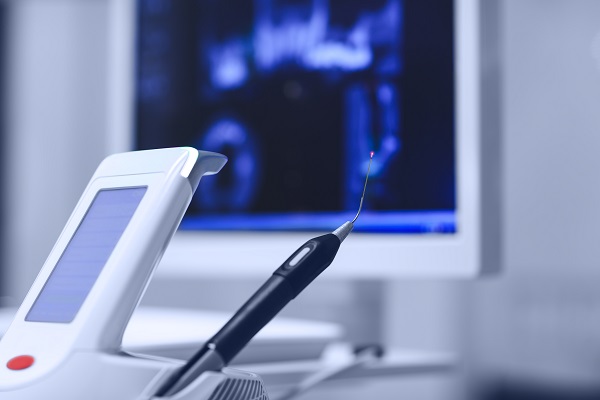Types of Oral Surgery That Use Laser Dentistry

Laser dentistry is the use of particular lasers to treat different types of dental conditions. Lasers have helped to treat several dental problems for many years. But they are not considered the mainstream in dentistry. Read on to find out some procedures that may involve lasers and why your dentist may recommend laser dentistry.
Laser dentistry
Dentists often use lasers for specific oral procedures. Dental providers may use either soft tissue or hard tissue lasers, depending on the treatment. If necessary, both types of lasers will be used. Many times, lasers are used in procedures involving soft tissues in the mouth such as the gums. Hard tissue lasers can cut hard tissues in the mouth like the teeth. Here are some oral procedures that involve laser dentistry.
Laser use in dentistry
Positive pressure air machines and dental splint appliances can help to treat sleep apnea or snoring. But when conservative nonsurgical methods are not effective, surgery may be recommended. Surgical procedures involve removing the soft tissues of the lower jaw or oropharynx. Laser surgery is a relatively new treatment option that can be beneficial. When it comes to treating obstructive sleep apnea, lasers can help to reshape the throat and to relieve the associated breathing issues. This is ideal when sleep apnea is caused by tissue overgrowth in the patient’s throat.
People with a tight or thick frenulum may benefit from a laser frenectomy. This treatment can help kids whose restricted frenulum causes them to be tongue-tied. It can also interfere with breastfeeding or speech development. Lasers can be used to remove a small piece of tissue, referred to as a biopsy, so that a dental professional can examine it for cancer. They are also used to remove lesions in the mouth and to ease the pain of canker sores.
Benefits of dental lasers
Many patients can benefit from laser procedures because they can be used in place of dental drills or anesthesia. This may help to minimize discomfort. For laser procedures, bleeding is usually more controlled, which reduces the need for sutures. There is also less damage to the surrounding tissue and healing and recovering times are often shorter. Additionally, bacteria are reduced at the surgical site since the light beam sterilizes the area. This reduces the risk of infection.
Risks of laser dentistry
The risks of laser dentistry are considered to be relatively small. For laser treatment, it is advisable to find a qualified dental professional. This is important because using an inappropriate power level or wavelength could damage tissue. Many providers are also concerned that the use of laser treatment is being pushed by advertisers beyond what individuals actually need. A dentist should always give a patient a pair of glasses to protect the eyes from the laser.
Consult with your dentist
Dentists use lasers in many different procedures inside the mouth. Lasers can make dental treatments more comfortable, affordable, and efficient. Before considering any type of laser treatment, you should consult with your dentist. Your dentist can determine if the treatment is right for you.
Are you considering laser dentistry in the Huntsville area? Get more information at https://www.smilesbydesignhuntsville.com.
Check out what others are saying about our services on Yelp: Read our Yelp reviews.
Related Posts
Anyone who has a broken or missing tooth can benefit from dental restoration. Dental restoration fixes or replaces teeth to improve oral health or function. This is a broad dentistry category, from simple restorations such as fillings to more extensive restorations such as dental implants or dentures. Some restorations offer cosmetic benefits; however, their main…
Nothing looks and feels quite like natural teeth. Therefore, if your tooth becomes decayed or damaged, a dentist will try to repair or save the tooth with a dental restoration. Most people who have been to the dentist have had some type of restoration. They range from simple filings for cavities to crowns for more…
Dental bonding is one of the most versatile and minimally invasive restorative and cosmetic dental procedures. Dental bonding is the go-to procedure for many patients looking to fix imperfections or enhance their smile, from enhancing the appearance and shape of teeth to repairing damaged enamel. Whether you are new to cosmetic dentistry or considering touch-ups…
Dental restoration is a term used to describe the process of repairing or replacing damaged, decayed, or missing teeth. Several dental restoration options are available to patients, ranging from simple fillings to more complex procedures such as dental implants and crowns. This article will explore some of the most common dental restoration options available and…
